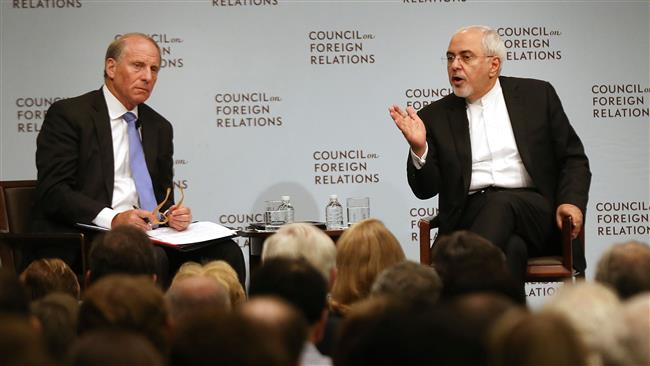
RNA - During a press conference held in New York with President of the Council on Foreign Relations Richard Haass on Monday, Zarif noted that the US will become the prisoner of its own sanctions if it does not alter is current policies.
Zarif went on to stress that imposing sanctions on others countries usually does not yield a positive outcome.
Last month, US Senate voted for a bill to impose new sanctions on Iran over its ballistic missile program, alleged support for terrorism, and human rights violations.
Iran’s top diplomat went on to criticize the US and its allies over their refusal to take part in a UN organized summit aimed at banning the use of nuclear weapons.
Earlier in the month, the United States, along with Britain and France, announced that they would never become party to a global treaty that was endorsed by 122 countries at the United Nations headquarters in New York.
Zarif went on to note that Iran would always remain dedicated to its vow over never producing nuclear weapons.
"We believe that nuclear weapons do not augment anybody's security. Our objection to nuclear weapons does not recognize friend or foe. We simply believe that nuclear weapons are unacceptable and -- in our view -- illegal because of their consequences,” he said.
The Iranian foreign minister also noted that despite differences between Iran and Saudi Arabia over the conflicts in Yemen and Syria, he hoped that Tehran and Riyadh could work together towards resolving the issues.
“If we don't agree with each other about the situation in Yemen or about the situation in Syria, we can still work with each other in order to bring those situations to an end. We believe nobody is gaining from the continuation of the conflict in Yemen," he added.
Saudi Arabia has been leading a destructive military campaign against Yemen since March 2015 to reinstate former president Abd Rabbuh Mansur Hadi and crush the Houthi movement.
The campaign has seriously damaged the country's infrastructure. Local Yemeni sources have put the death toll from the Saudi war at over 12,000, including many women and children.
He warned that a plan by Iraq’s semi-autonomous Kurdistan region to hold an independence referendum would have negative consequences for the country.
"We believe that the referendum is not the right choice. We believe that it would bring about centrifugal tendencies in Iraq that would be disastrous for the country, and it would not be limited to the Kurdish population,” Zarif said.
The president of Iraq's semi-autonomous Kurdistan Regional Government, Masoud Barzani, announced on Twitter in June that the northern territory would hold an independence referendum on September 25 not only in the three provinces that make up the Kurdish region, but also in the areas that were bone of contention between the Iraqi Kurdistan Region and the central government in Baghdad.
Iraqi Prime Minister Haider al-Abadi said on June 13 that the Kurdish minority's decision to hold an independence referendum was untimely.
“I believe the impact on Iraqi security would be disastrous, and the impact on regional security would be disastrous. So, we have advised our friends in Iraqi Kurdistan -- and all of them are our friends, from Mr. Barzani to others in Iraq. We have advised all of them that this is the wrong choice and they should not make this choice," Zarif added.
847/940